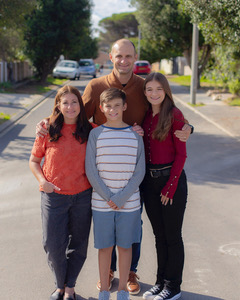
Prayer Requests








South Africa, with its breathtaking landscapes and complex history, has always been a place of paradox. A nation torn by division yet brimming with hope, brokenness yet deep resilience. But as I journeyed through its vibrant towns, rural villages, and remarkable grasslands, I saw something I didn’t expect—something that touched me to the very core of my being. God is moving in South Africa in powerful ways, calling the nation to a deeper unity, true reconciliation, a restoration of its original design, and a revival that transcends its past.
What I witnessed there was not only a reflection of God’s heart for South Africa, but a revelation of His deep love and urgent calling for the Body of Christ worldwide. In this place of both pain and promise, God rekindled passions in my own personal heart, reminding me of His divine blueprint for reconciliation, justice, and unity. This journey wasn’t just about what God is doing in a nation; it was about what He’s doing in me—and in the Church.
As I reflect on my experience, I invite you to walk with me through a story of awakening—both personal and collective. This is a call to the Body of Christ to step into the fullness of God’s purpose for each and every nation, to embrace His call to unity and reconcilation, and to take part in the redemptive work He is doing in the world.
It was quite a surreal and nothing short of unique experience to go from stunning coastline real estate to tin shanty villages just around the corner. Nonetheless, I encountered the most faith-filled and joyful worshippers in these villages. I daily sat and soaked in the Afrikaans and Xhosa songs to the Lord and I will forever be marked by the presence of God despite my inability to interpret these languages. It was the upmost honor to get to join local nurses in their weekly rounds to shanty homes and visit patients suffering from some of the most horrific illnesses due to the community’s lack of running water, sanitation, and toilets. To my surprise, God struck me over and over again of the richness of their joy, the wealth of their hope, and the prosperity of their altruism. The easily noticeable gift of unity in these communities directly affects the nation’s attack on unity as a whole.

We are the Prince family made up of Casey, Sarah, Kieren and Keller. We are American missionaries from Raleigh, NC who are serving in South Africa. We founded the Ubuntu Football Academy, a ministry dedicated to using soccer to: take people out of poverty, ignite their God-given dreams, and disciple them into young men and women who will be citizens that change the world.
Learn more about them here!
One of the most impactful aspects of my time in South Africa was working alongside Ubuntu. Sarah Collins Prince, co-founder, stated that “in South Africa they aren’t taught to dream, just survive.” Their missionary work exemplifies the very heart of reconciliation—bringing people together from different backgrounds, healing wounds of the past, demonstrating the power of the Gospel to unite a divided people, and rekindling their fire to be a part of something much bigger than themselves. Through their efforts, I saw firsthand how the Body of Christ is being used as a tool for God’s redemptive work, not just in South Africa, but globally.
Humanity’s fallen nature fosters pride, selfishness, and division, which is evident in South Africa’s post-apartheid struggles. Even though it ended over 30 years ago, deep societal scars persist—urban-rural divides, cultural tensions, and unresolved historical wounds. Yet, God’s purpose for South Africa remains unchanged. The Old Testament similarly shows Israel’s division, yet God repeatedly calls them to unity and reconciliation.
South Africa’s disunity reflects the broader realities of sin and injustice, as well as the ongoing challenge of living out God’s call to reconciliation. Reconciliation is a central tenet to the Christian faith—Jesus broke down barriers, reconciled us to God, and calls us to unity (first with Him, then with each other). As the Church, we are meant to model such unity, though we often fall short.
Despite the disunity that marks the present (both in South Africa and globally), Christians hold on to the hope of a future, unified Kingdom of God. Revelation 7:9 paints a picture of people from every tribe, tongue, and nation worshiping together. This vision reminds us that, while the world is broken, God’s Kingdom is one of peace and reconciliation. Christians are called to work toward that unity today, promoting justice, peace, and love in every aspect of life.

While in South Africa, the Lord also did a mighty work in my own personal heart. God has a profound way of revamping our passions, aligning them with His will and purpose. This transformation is deeply personal, but it also ties directly into the larger call for unity within the Church. The process of God renewing our passions isn’t just about finding personal fulfillment or purpose; it’s about positioning our hearts to reflect His heart for the world.
When God revamps our passions, He reorients our desires toward things that reflect Him. The connection between this personal transformation and the Church’s call to unity is clear. The Church is meant to be a unified body, but unity isn’t merely about agreeing on doctrine or having common goals; it’s about having a shared passion for Christ’s mission to the world. This fosters a deep sense of connection and shared purpose, which is foundational to the unity the Church is called to embody.
In the end, God’s revamping of our passions isn’t just for our benefit; it’s for the benefit of the Church and the world. As our hearts align with His, we become agents of His peace and unity, contributing to a Church that reflects the diversity of His Kingdom while remaining unified in purpose and love. Through this, the Church not only grows closer to each other but also becomes a powerful witness to the world of God’s reconciling love-something, I believe, South Africa is uniquely called to model.
Another key attribute of God’s original design for South Africa is to be a light to the nations. Icons like Nelson Mandela and Desmond Tutu became symbols of peace and reconciliation worldwide. The journey of the“rainbow nation” can inspire other countries that struggle with division, oppression, and injustice, demonstrating that true healing and unity are possible through God’s power and guidance.
Disunity in South Africa, like any country, is a result of the brokenness of humanity and the deep impact of sin. Yet, the Christian message of reconciliation, justice, and hope provides a path forward. As South Africa continues its journey of healing, the Church is called to lead the way—modeling the unity, peace, and love that can only be found in Christ.

















emily@globalprayerarmy.com